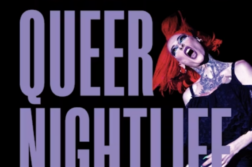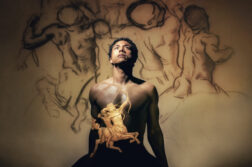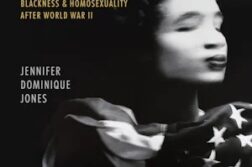C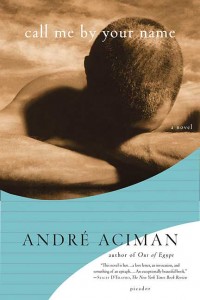 all Me By Your Name
all Me By Your Name
by André Aciman
Farrar, Straus and Giroux. 256 pages. $23.
“Do I dare to eat a peach?” Read this book and the line from T. S. Eliot’s “The Love Song of J. Alfred Prufrock” will take on quite a new meaning. Aciman, who’s an authority on Marcel Proust, channels the master in the telling of this romance between 24-year-old Oliver, a graduate student, and the budding 17-year-old Elio—son of a professor with whom Oliver is working. It is the boy who tells the story, albeit from a distance of decades. In a sense, the novel is a remembrance of things past, a conjuring much like Proust’s of a world of sensation and sensuality, of longing and ecstasy one summer on the coast of Italy. From the sound of cicadas to the intimacy of the odor inside a recently worn bathing suit, it is a world of ultra-awareness. We are filled with this boy’s exuberance, anxiety, and joy. Only in the short, final section of the book, when Elio tries to sum up the years since that summer, does the novel lose its rapture. Elio, as narrator, brings to mind Olivier, the boy in André Gide’s The Counterfeiters, who, upon attainment of his desire, wanted to die, knowing that he would never again feel such fulfillment. This magical summer on the Italian Riviera is too intense, too utopian ever to continue into less glowing seasons. Paradoxically, it is also too deep ever to disappear. To quote a poem by D. H. Lawrence, “time will dim the moon/ Sooner than our full consummation here/ In this odd life will tarnish or pass away.” So it is with Elio and Oliver. Aciman’s word mastery is as dazzling in this gay love story as it was in his acclaimed memoir Out of Egypt. His new book makes a sacred rite of this teenager’s discovery of self, eros, and love, one that provides the reader with an exquisite trip into the human psyche.
Jack Miller
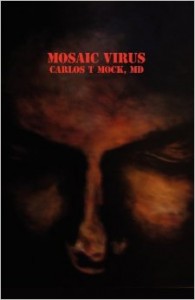 The Mosaic Virus
The Mosaic Virus
by Carlos T. Mock, MD
Floricanto Press. 268 pages, $24.95
This is a medical, religious, and political thriller all rolled into one. Carlos Mock has set the novel in 1983 when 37 priests (and counting) in the U.S. have died mysteriously. The Vatican and the FBI each dispatches an investigator, the former a Jesuit priest from Argentina, the latter a female agent with whom, coincidentally enough, the priest was once romantically involved. Needless to say, these feelings are revived as they sleuth together. A key component of the mystery is the 1967 death of Francis Cardinal Spellman, who in this account is a Jewish convert to Catholicism. Spellman (né Jacob Goldman) became the secretary and translator to Bishop Siri (later a cardinal himself). Spellman’s identity is found out and he’s turned over to the Nazis. This is done to enforce the Pope’s neutrality decree and to counter an SS chief’s accusation that the Vatican was “a friend of the Jews.” After Spellman’s release from a concentration camp, he’s made a cardinal as a way for the Church to assuage its guilt. He’s later exposed as a homosexual and a pedophile, a matter the Church tries to hush up. Could Spellman’s sexual secret be linked to the death of several gay priests? That is the question our two sleuths must confront. Next there arises the intriguing possibility that the Church is implicated in the spread of a biological agent. Unfortunately, Mock’s handling of the story doesn’t fulfill its promise. Indeed, the book is a literary mess: the plot is too complicated and at times confusing, and the characters are so poorly drawn that one is hard-pressed to care about any of them. One senses that the author doesn’t have a thorough knowledge of Vatican politics and protocol, as the goings-on at the Vatican stretch all credibility. Perhaps a stronger editorial hand could have saved this book.
Charles Michael Smith
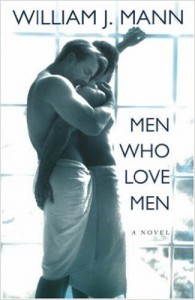 Men Who Love Men
Men Who Love Men
by William J. Mann
Kensington. 432 pages, $24.
With Men Who Love Men, the well-established novelist and biographer William J. Mann completes a trilogy that began with Men from the Boys in 1997 and Where the Boys Are in 2003. Set almost entirely in Provincetown, with that town becoming almost a character unto itself, Men Who Love Men takes place over the course of one recent summer. By far the most fully realized of the trilogy, it focuses on Henry, the character who has previously morphed from nerd to party animal to guest house employee, all the while seeking true love. Henry’s friends Jeff (a novelist) and Lloyd (a therapist) own Nirvana, the lofty name of an otherwise rather ordinary B&B, and Henry has always been in love with both of them, a state made much more difficult by the couple’s impending wedding. Thrown into the mix are Jeff’s sister and her son, a little boy whose difficulties at school would be understandable to anyone reading Provincetown’s weekly newspaper, but which comes as a shock to Mann’s characters. Nirvana’s rule against employee-guest fraternizing makes for some tense moments, and Henry has to deal with a young and unstable budding novelist who may be using Henry to stalk Jeff. By the end of the novel, love seems to have come for Henry, and though there are no surprises, there is a satisfying sense of completion for the characters and the trilogy.
Martha E. Stone
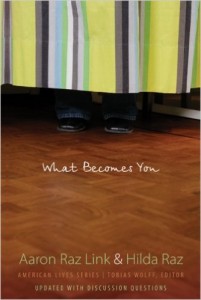 What Becomes You
What Becomes You
by Aaron Raz Link and Hilda Raz
Univ. of Nebraska Press. 314 pages, $24.95
This collaborative memoir by Aaron Link and his mother Raz (Trans; Living on the Margins) explores the complicated terrain of gender, sexuality, and family. Insistently “not an autobiography,” the book is divided into individual sections by each author, described as “pieces that don’t fit the picture.” Link, born as Sarah, underwent female-to-male sex reassignment at the age of 29. His loosely chronological section explains that the process of physical transition reflected a lifelong understanding of his true gender. Within the narrative, he elaborates the complications of his birth gender in medical, legal, and philosophical terms, meditating on what it means to be gay and male after living thirty years in a biologically female body. Raz, in the second section of the book, focuses on her difficulties in coming to terms with losing a daughter. She scrutinizes her role in Link’s story as a mother, a woman, and a feminist, writing with eloquence and humor about her transformation following Link’s decision to change sex legally. Her narrative deepens our understanding of Link’s experience and of the connections between a mother and child. They have their moments of levity, but both Link and Raz express their anger about the medical and legal barriers they must surmount. While the book investigates the role of gender and sexuality in contemporary society, the authors strive for an understanding of identity inseparable from individual experience.
Megan Friddle
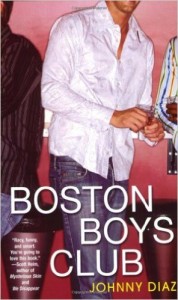 Boston Boys Club
Boston Boys Club
by Johnny Diaz
Kensington. 304 pages, $15.
Boston Globe staff writer and blogger Johnny Diaz moved to the Boston area a few years ago from Miami. Boston’s Club Café, situated in what was once the very gay South End, is the frequent setting for Diaz’ debut novel, Boston Boy’s Club, and while most of his characters are in their early thirties, they seem somewhat immature and unformed. Kyle is a model and one-time minor TV celebrity, Rico is an apartment rental agent, and the unfortunately-named Tommy Boy is a reporter at a Boston newspaper. Their various problems, which include a serious health crisis, an alcoholic boyfriend, an inability to commit to more than one-night stands, all resolve nicely, if predictably. Lending local color are a number of minor Boston newsmakers, and readers will enjoy figuring out who’s who. As much a love letter to Boston as Mann’s novel is to Provincetown (see above), Boston Boys Club feels unfinished and might have benefited from a stronger editorial hand. Though its fluff content is high, one hopes for a more substantial follow-up; Diaz’ second novel is set for release in 2008.
Martha E. Stone
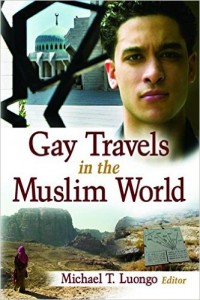 Gay Travels in the Muslim World
Gay Travels in the Muslim World
Edited by Michael T. Luongo
Harrington Park Press. 193 pages, $19.95
Few topics in gay-themed books are timelier than homosexuality in the Muslim world. Since 9/11, Americans have struggled to understand a culture we previously treated as an exotic story land. Nowhere was this more pronounced than in our popular culture’s depiction of Arab sexuality: darkly handsome men, cruel but sexy half-naked slave boys, women in jewels and veils dancing for the pleasure of their masters. Gay men easily appropriated these images for their own erotic fantasies. The fantasy is over. In eighteen short essays, Gay Travels in the Muslim World explores actual male-male sexual encounters in Afghanistan, Egypt, Israel/Palestine, and Iraq, places we now take very seriously. A few essays are embarrassingly condescending accounts by well-off gay men on guided tours who complain when their hotels lack hot water and the locals are too aggressive. Several are wistful descriptions of unfulfilled desire: that of a gay marine from Alabama for a handsome Iraqi soccer player; that of an Israeli soldier on leave who brings a skinny Arab boy home and waits for his parents to leave before they have furtive sex. There are many accounts of cruising, of telling eye contact and flirting that can go nowhere. But the authors of the best essays learn from their travels. For Muslim men, sex with other men is an act, done for pleasure or profit or expediency, but not indicative of a way of life. In a culture based on male superiority, men can show public affection for each other that appears sexual to us but is not. As in other Third World countries, financial realities in the Middle East dictate that elder care will largely be provided by one’s progeny, so even gay men usually end up marrying and having children. John Champagne’s account of a visit to Marrakech is a high point for the quality of its writing and insightfulness. But the book is marred by the editor’s poorly written introduction and the uneven quality of the essays.
Daniel A. Burr




